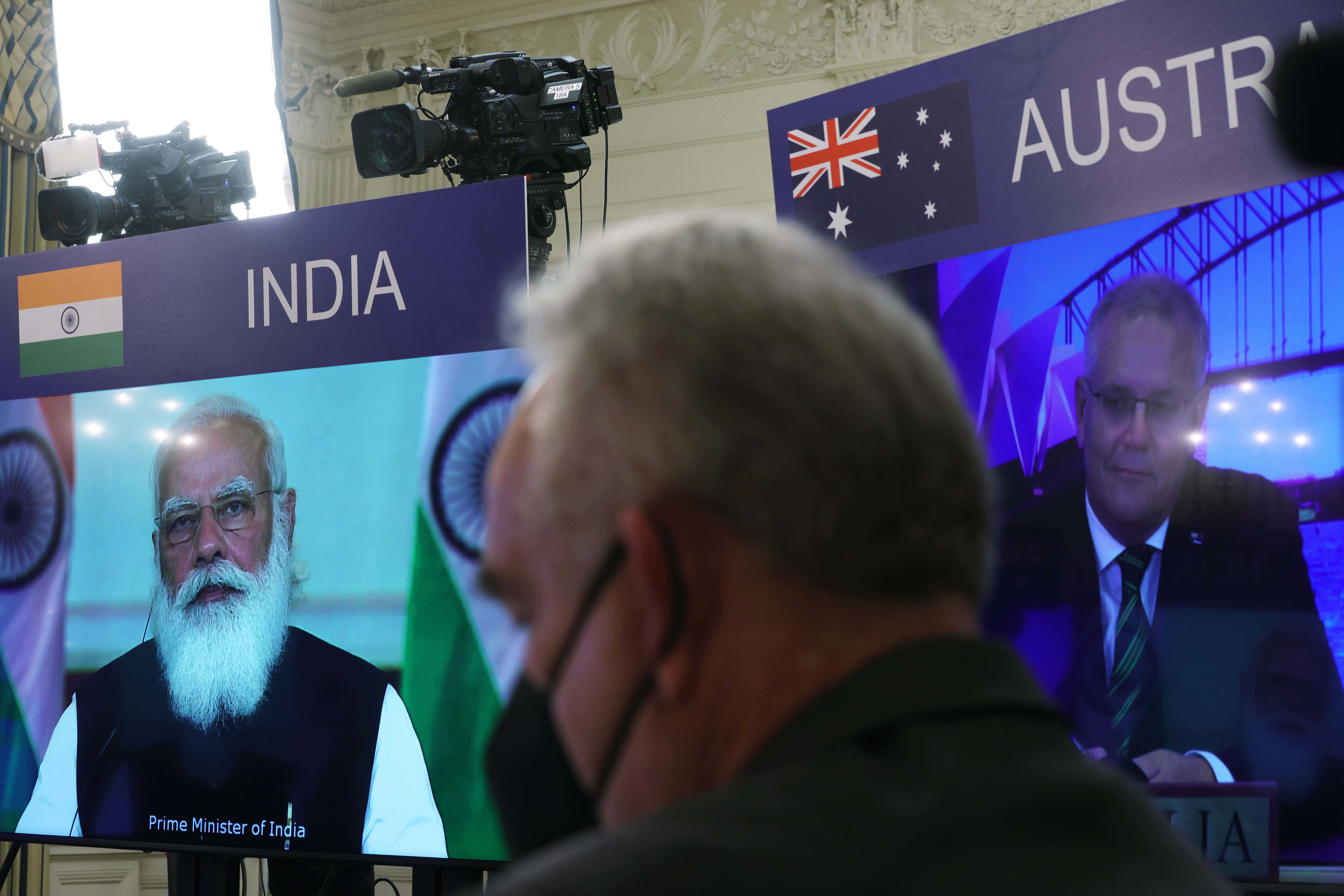Joe Biden sends a clear message to China at virtual Quad meet, says 'free and open' Indo-Pacific is essential

President Joe Biden on Friday, March 12, spoke with leaders of Australia, India and Japan -- members of the Quadrilateral Security Dialogue or Quad along with the US -- where he emphasized a “free and open Indo-Pacific is essential” in his opening remarks. The Quad is a united forum for some of the world’s most prominent democracies to counter the growing economic clout of China.
Last week, Axios said in a report that Biden was planning to meet with the leaders of the other three Quad nations in a virtual summit, citing people who are familiar with the issue. It is said by showing the president’s intention to hold the meeting, the White House conveyed the message that the US holds its partners and allies important in countering China’s growing influence in the Indo-Pacific region. Biden has been accused of taking China lightly by his opponents and the step to hold the virtual Quad meeting could also be a calculated one by the current Democratic regime to counter the charge.
RELATED ARTICLES
Joe Biden plans to counter China's growing influence by holding first virtual talk with 'Quad' nation leaders
Xi Jinping warns about 'new cold war' as White House dithers about China policy, fate of TikTok and Huawei 5G
“We all are concerned about a free and open Indo-Pacific is essential to each of our futures, our countries. The United States is committed to working with you our partners, and all our allies in the region to achieve stability,” Biden said in the meeting with Australian Prime Minister Scott Morrison, Japanese Prime Minister Yoshihide Suga and Indian Prime Minister Narendra Modi. It was Biden’s first multilateral leaders’ meeting since taking oath in January and according to National Security Advisor Jake Sullivan, it was something deliberate.
The summit “cemented a group of strong democracies that will work together going forward to secure a free and open Indo-Pacific,” Sullivan told reporters at a briefing at the White House. “The Quad, at the end of the day, at the end of today, is now a critical part of the architecture of the Indo-Pacific.”

A senior official of the Biden administration told the media ahead of the meeting that it would involve “an honest, open discussion about China’s role on the global stage,” referencing “challenges in the region” to free and open trade and commerce.
Biden, who has spoken with the three premiers individually since taking office in January, said: “The Quad is going to be a vital arena for cooperation, Pacific, and I look forward to working closely with all of you in the coming years.”
Don't cooperate to target third party, warns China
China reacted to the Quad summit with words of caution. Hours before the summit took place, Beijing said exchanges and cooperation between countries should contribute to mutual understanding and not target a third party and pursue “exclusive blocs”. Chinese Foreign Ministry Spokesperson Zhao Lijian said in a media briefing in Friday that “exchanges and cooperation between nations should contribute to the mutual understanding and trust among nations, rather than targeting a third party or damaging the interest of a third party”. He also added: “We hope that relevant countries uphold the principles of openness, inclusiveness and win-win results and refrain from pursuing exclusive blocs and do things that are conducive to regional peace, stability and prosperity”.

Evan Feigenbaum, who works with Carnegie Endowment for International Peace, Washington DC, said the Biden administration is trying to join hands with partners to change the international operating environment for China rather than confronting it directly. “The problem that the United States has had for the last several years is that while many countries share American concern about the trajectory of Chinese policy, and thereby, to use a medical metaphor, share the American diagnosis, they don't necessarily share the prescription,” he said, adding: “So what they'll hope to get out of the meeting is to signal to the region that American policy in Asia begins with allies and partners, not with a headlong rush to Beijing to negotiate the terms of the region's future.”
During the meeting, the four nations also agreed to establish working groups to cooperate on vaccines, climate change and technology, including the subject of cybersecurity. A joint statement issued by the Quad leaders, called “The Spirit of the Quad”, said they are in consensus to set up the working group on vaccines as well as “a critical and emerging-technology working group to facilitate cooperation on international standards and innovative technologies of the future; and ... a climate working group to strengthen climate actions globally on mitigation, adaptation, resilience, technology, capacity-building, and climate finance”.
The four leaders also agreed to meet in person before the end of 2021.










